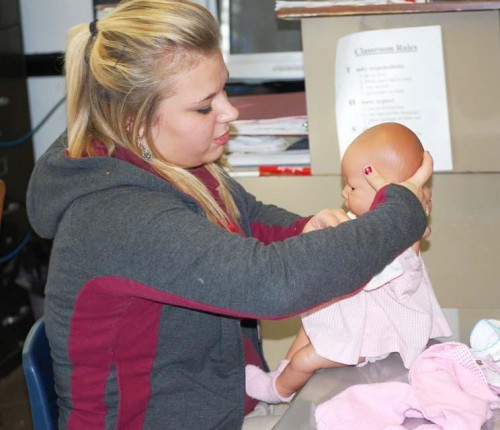Robert David "Speck" Gros
January 13, 2009Downtown Art Gallery (Houma)
January 15, 2009Sixteen-year-old Kristalee Himel learned firsthand that she’s too young to take on the responsibility of motherhood.
Fortunately, the Terrebonne High School junior was able to give her child back after 24 hours.
The baby, a computerized simulation of the real thing, sits locked in a closet, waiting on the next unsuspecting teen parent.
Teen pregnancy is becoming an all too common occurrence. Terrebonne Parish has the highest “births-to-teen” figures in the Tri-parish area.
According to the Louisiana Department of Health and Hospitals’ 2005 birth-to-teen statistics, 250 babies were born to Terrebonne females between the ages of 15 and 19. Lafourche was close behind with 144, followed by St. Mary, which had 127 births in the same age group.
But one program, Terrebonne General Medical Center’s Steps to Success, is seeking to turn that trend around locally.
“The high figures are why we need to have parenting education programs to ensure that parents are doing all they can to be good parents, and teenagers have the proper education so that they won’t become parents too early,” said Kristie Mazur, Steps to Success’ support service coordinator.
Terrebonne has the Tri-parishes’ only active teen pregnancy prevention program, which is called Realityworks. It is designed for females and males, ages 10 to19. The program is aimed at teaching adults and teens how to make responsible decisions about life regarding sex, pregnancy and parenting.
Mazur said the program is funded in large part by the Louisiana Children’s Trust Fund to provide pregnancy prevention education to teens via the Terrebonne Parish school system’s “Baby Think It Over” program, which is conducted as part of the family and consumer science classes.
Kathy Wallace, one of Terrebonne High School’s family and consumer science teachers, said the program is designed to give high school students the experience of caring for an infant.
Each year, more than 70 baby dolls, programmed to cry and behave like infants, are distributed through the family consumer science classes to teens for 24 to 72 hours.
“The program is not exactly real life, but it gives the students a simulation of it,” Wallace said.
Just like any real-life pregnancy situation, the students pick the ethnicity of their babies, but not the gender.
“It simulates the whole birthing experience,” she said. “When you have a baby, you choose your partner, which determines the race of the baby. But you don’t have control over the gender of the baby.”
At the beginning of the parent education course, students are interested in having the babies, holding them and playing with them in class, Wallace said. However, oftentimes they change their minds once the babies are in their care.
“Most of the students conclude that they don’t want to be teenage parents by the end,” Wallace said.
Himel wasn’t completely new to the baby experience. She has a 2-year-old sibling. And her older siblings have young children too. But having a baby 24/7 was a new experience.
On Oct. 21, she took one of the class-assigned babies home. Equipped with a car seat, two outfits, a blanket, a bottle and a diaper bag, Himel, like so many of her peers, believed she was ready for the challenge.
But once she arrived home with the baby, things did not turn out the way she had planned.
“The simulation is not fake like I thought it would be,” Himel said. “It wasn’t what I expected at all. Having a baby is hard work at a young age. I mean, I will probably be better at it when I am older, but that’s when I am older.”
At the end of the session, Mazur provided Wallace with a printout from the data collected on a computer chip inside the doll that shows how well students cared for the babies.
Himel passed the course, but there were a few bumps along the way. Out of the 10 times her baby wanted food, the teen forgot to feed it once. And of the 10 times the baby needed to be changed, she forgot three times.
By the program’s end, Himel said, “I don’t want a baby anytime soon.”
Nicolette LeBlanc, a senior at Terrebonne High School, was a classmate of Himel’s. In an essay to Wallace, she wrote, “The whole experience made me not want to have a baby for a while, especially in high school. Babies need a lot of attention and I don’t have the time to give a child that much attention.”
Besides her studies, LeBlanc is active in dance and soccer and has a part-time job. She wrote that if she were to have a child, all that would change.
“My grades would start to slip, and I would probably have to quit soccer and maybe dance,” she said. “All of my money would go straight to the baby. Not to mention that I love to sleep late. With a baby, I would always be tired. I am just not ready for the responsibilities of having a baby.”
LeBlanc also passed the course. Her printout showed that out of the 19 times the baby wanted food, she neglected it twice. Out of the 19 times the baby needed burping after feeding, LeBlanc neglected it four times.
These students handled programmed babies, but what about real life?
Over the past 10 years, Terrebonne’s Realityworks program has serviced more than 9,500 people, Mazur said. She has seen a decrease in the number of teens having babies in the area, but admitted there is still more educating to do.
Realityworks recently received a $1,000 grant from Entergy to further promote teen pregnancy prevention in the parish.
“With Terrebonne having a teen pregnancy rate that is higher than the state and national average, we need a program like this to stick around,” she said.
Former Gov. Mike Foster and Sens. Mary Landrieu and John Breaux started the statewide Steps to Success program, which is funded through the Louisiana Department of Social Services, in 1998.
The program ensures that parents of all ages and races have the resources they need to raise healthy children.
Besides Realityworks, other components of Steps to Success include the Fatherhood Initiative, which is offered through the juvenile justice system, the Hands of Parenting program held weekly for mothers between the ages of 13 and 25, and parenting classes held monthly at the TGMC Outreach Center in Southland Mall.
Parents can also call the TGMC’s parenting hotline at 1-877-829-7837.
Kristalee Himel, 16, a junior at Terrebonne High School, holds a doll presented to “parents” in the Realityworks program. The computerized infants record students’ handling of the child over a 24- to 72-hour period. * Photo by KYLE CARRIER











